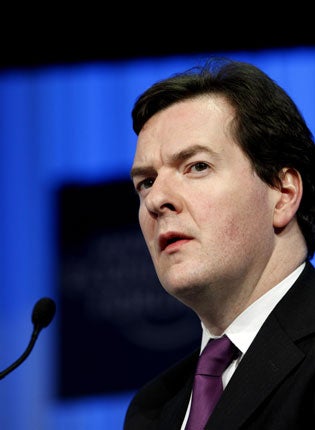Economy is too weak to handle cuts, Osborne is warned

One of the nation's leading economic authorities today adds to the pressure on George Osborne to execute a U-turn on his economic policies.
The National Institute for Economic and Social Research (NIESR) urges the Chancellor to "ease off" spending cuts and consider tax rebates if the economy shows signs of a further sharp slowdown and says there is "a case for delaying some of the austerity programme but accelerating planned increases in the state pension age".
The NIESR adds that there will be no real-terms rise in house prices until 2013, allowing for general inflation, and that households will suffer a fall of 0.8 per cent in their disposable incomes this year. UK growth will be "only" 1.5 per cent, it says.
In a blow to the credibility of the Government's plans to reduce the country's debt levels, the NIESR also predicts that Mr Osborne will fail to meet his goal of eliminating the structural budget deficit by the end of this parliament, albeit narrowly.
The Institute warns: "The debate over the timing and scale of the consolidation is not over. In these circumstances we would argue for a delay in consolidation. Governments act slowly and expenditure cuts on goods and services appear to be delaying themselves.
"This process is likely to continue, and, if cuts cannot be made, either taxes should rise now or tax rises should be announced for the near future."
Such tax hikes, the NIESR stresses, should only be contemplated if the recovery does pick up, and might be better postponed until 2013. If the economy stumbles, it suggests a policy U-turn instead.
The NIESR's acting head, Ray Barrell, said: "If the economy does slow down sharply over the next six months, then the Chancellor should use fiscal policy to support the economy. The most sensible options would be to announce a temporary 'tax holiday' on national insurance contributions or income tax, or for tax rebates. These would have an immediate impact – changing public spending plans takes more time."
He added that the Government might in any case wish to "ease off" some of its departmental spending cuts, especially if they meet practical problems in implementation. In a flat contradiction of the argument the Chancellor reiterated over the weekend, the NIESR says there is little danger. "There appears to be no reason to think that the burden of interest payments is currently expected to be excessive, and real borrowing costs facing the Government are very low. In addition, there is little evidence to suggest that market perceptions of the risk of a government default have been worryingly high."
Angela Eagle, the shadow Chief Secretary to the Treasury, said: "It's time for George Osborne to get his head out of the sand, look at the facts and rethink his reckless plan to take another £20bn out of the economy in April on top of the VAT rise. He needs a plan B and he needs one quick."
But, in what may evolve into an unlikely political alliance between the Labour leadership and Tory backbenchers, the NIESR's call for tax rebates or "holidays" to stimulate growth may also find support among Tory tax cutters as the Budget, on 23 March, approaches.
Former cabinet minister John Redwood said: "To get enterprise growing, creating the many new jobs we need and welfare reform requires, we need tax cuts. The Chancellor should be dusting down plans to get the UK back into shape as a competitive place for business and investment. Recent years of tax increases have left us struggling, losing capital, talent and companies that could make a difference."
The Conservative Mayor of London, Boris Johnson, called last week for an end to the new 50p top rate of tax.
The NIESR comes close to endorsing the recent charge of the former head of the CBI, Richard Lambert, that ministers are putting politics before economics. A politically convenient timetable for deficit reduction – getting the "pain" over early, before facing a general election in 2015 – may conflict with the economically wise route of delaying spending cuts while the economy is weak and quickening the pace later as recovery strengthens.
It adds: "Our forecast highlights the fact that the planned consolidation is currently not large enough to achieve this [the 'Fiscal Mandate' set by the Chancellor] and taxes will eventually have to rise.
"We would not argue for further consolidation immediately and we have consistently argued for consolidation only when the economy can support it; our view remains that this will not be the case in 2011."
The Fiscal Plan, says the NIESR, will fail to end the structural deficit: "On the basis of the current fiscal consolidation plan, this target will be missed, albeit by less than 0.5 per cent of Gross Domestic Product."
A Treasury spokesman responded; "Dealing with the deficit is a vital pre-condition to growth and abandoning the plan which has restored internationally credibility, helping to keep market interest rates low, would only store up bigger problems."
Subscribe to Independent Premium to bookmark this article
Want to bookmark your favourite articles and stories to read or reference later? Start your Independent Premium subscription today.

Join our commenting forum
Join thought-provoking conversations, follow other Independent readers and see their replies